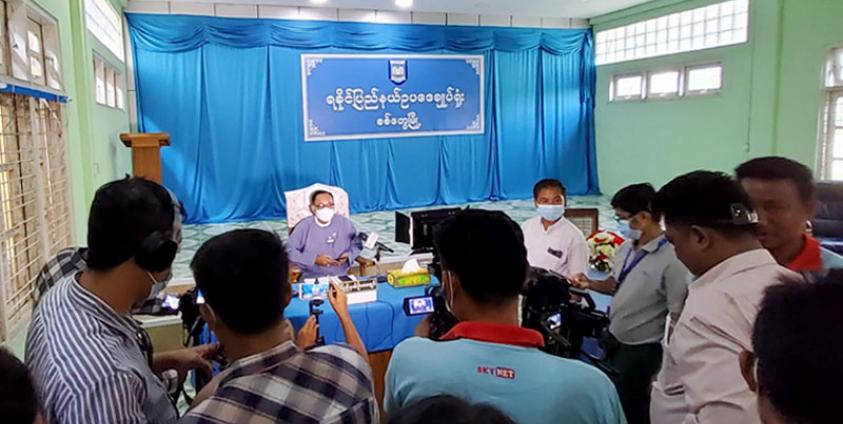Following the coup, the Military Council has persisted in prosecuting media outlets and journalists based in Rakhine State, resulting in the prosecution of five journalists to date.
Those facing charges by the Military Council include the editor-in-chief and a reporter from Narinjara, the editor-in-chief and a reporter from Western News, and a reporter from the Development Media Group (DMG).
These five individuals have been charged under Section 505-A of the Penal Code, Section 66(D) of the Telecommunication Law, Section 124A of the Sedition Law, and Section 65 of the Cybersecurity Law.
A female journalist based in Rakhine State expressed feeling increasingly insecure following the Military Council's obvious targeting of journalists.
She told DMG, " Since the Military Council intensified its efforts to target and apprehend journalists and news outlets, conducting field reporting has become extremely challenging. With increasing constraints on gathering field information, the accuracy of
our reporting is at risk. At the same time the growing number of arrests has left journalists feeling mentally and physically insecure.”
Journalists condemned the Military Council's actions of arresting and prosecuting journalists as a deliberate attempt to suppress press freedom, hinder the public's right to access truth, and instill fear among the journalistic community.
On October 29th, approximately 20 soldiers and police personnel conducted a raid on the office of DMG, a Rakhine media outlet. They cordoned off the office, as well as apprehending DMG reporter Ko Htet Aung, along with a night watchman.
The two DMG employees who were arrested are currently facing charges under Section 65 and are in custody at the Sittwe Township Police Station. The rest of DMG employees had to go into hiding as a precaution.
Following the Military Council's coup on February 1st, 2021, the media sector experienced repression through various tactics, including revoking publishing licenses of outlets reporting on the Military Council's human rights violations, conducting office raids, and arresting and incarcerating journalists.
As a result, in the early days of the post-coup period, media professionals from across the country had to flee, although at that time, the Military Council had not yet specifically targeted journalists in Rakhine State.
However, this situation changed in January 2022 when the editor-in-chief of Western News, a media outlet based in Rakhine State, along with a reporter, were charged by the Military Council under Section 124A of the Sedition Law.
Two months later in March 2022 , the editor-in-chief of Narinjara News and a reporter also faced charges from the Military Council, this time under Section 66(D) of the Telecommunication Law.
However, DMG reporter Ko Htet Aung became the first journalist to be practically arrested by the Military and subsequently prosecuted in the aftermath of the coup.
"The Military Council is not just violating human rights standards, but all regulations and ethics.
They see the news media as a threat. Rakhine-based media are facing severe harassment in recent days. Press freedom has vanished completely”, U Zaw Zaw, spokesperson of DMG said.
Both the editor-in-chief and several journalists and other staff members of DMG have already faced charges under Section 17(2), Section 66(D) of the Telecommunication Law, and Section 505-A of the Penal Code since 2019, before the coup.
Now news outlets and journalists based in Rakhine State are encountering growing challenges and obstacles in their reporting efforts as a result of the Military Council's targeted arrests and prosecutions.
"The threats to journalists' safety have escalated significantly. Gathering and delivering information has become extremely difficult. I want to express my strong condemnation for every office raid targeting news agencies”, Ko Wunna Khwar Nyo, editor-in-chief of Western News said.
Media outlets based in Rakhine State, including DMG, Narinjara, Western News, and Border News Agency, have been diligently observing and reporting on regional economic, political, and human rights developments.
Currently the editor-in-chiefs and journalists from these news outlets, who have faced prosecutions by the Military Council, have relocated to safer environments and are actively maintaining their news operations.
On a worldwide scale, Myanmar stands as the third-worst country in terms of journalist arrests. Since the coup, over 50 media personnel have been apprehended and are being held in prisons throughout the country.








